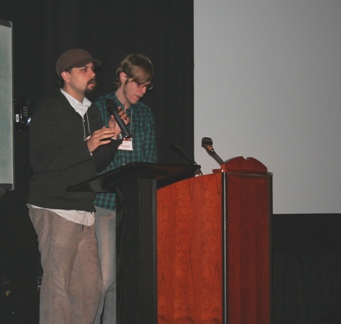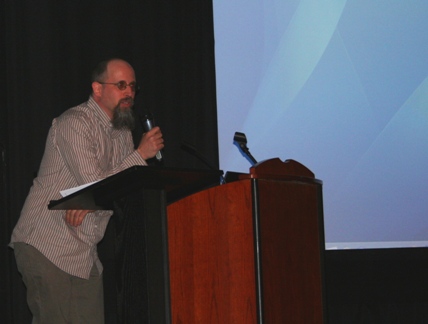
Washington Square surveillance footage, 1968
After lunch at the nearby Apple Restaurant, Leah Churner and Kathleen Maguire from NYU's Moving Image Archiving and Preservation Program (MIAP) introduced some 1966 footage of Washington Square Park from the Bob Parent Collection. Bob Parent is perhaps best known as a still photographer of Jazz musicians and album covers. But through the late 60s and 70s, Parent documented several movements in New York - the Black Panthers and Women's Liberation among others. Some 500+ reels of footage were donated to the Bob Parent Collection, an invaluable resource for historians and documentary filmmakers.
Dan Streible next introduced an NYU Surveillance Film from March 6, 1968. This was footage taken by the police of a Dow Chemical Demonstration on NYU's campus. It's a powerful document that follows the protest as it grows from dozens to hundreds of participants. The footage was also now been made all the more powerful by the addition of an original musical score provided by NYU film scoring students. The film is currently available at the NYU University Archives.

Dan Drasin introduces Sunday
Dan Drasin was next to take the stage and introduce his film, Sunday. Drasin grew up hanging out in Greenwich Village, and at the age of 18, inspired by his film heroes, he borrowed some film equipment to document a Sunday protest. In 1961, folk musicians and their appreciators were protesting for their right to sing and perform in Washington Square Park. Dan's footage captures the interaction of protesters and police and brings to mind Martyn See's protest film from earlier in the program. Sunday was well received when it was first shown and is considered one of the first social-protest films of the 1960s. After 40 years though, the film had faded into obscurity, and Dan Streible helped to organize its current restoration. After the screening of the newly restored Sunday, the crowd broke into enthusiastic, thunderous applause - it's an incredible document that still speaks vividly to modern viewers.
View Sunday and other Dan Drasin short films here.

Andrew Lampert and Steven Villereal
Andrew Lampert of New York's Anthology Film Archives and Steven Villereal of the NYU MIAP program then introduced found footage of Gordon Hitchens interviewing filmmaker Emile de Antonio in 1967. Strange reels of film found their way to the doorstep of Anthology and this was one of the many treasures discovered by the archive. Emile de Antonio discusses his film Point of Order and summarizes his intentions for making the film. Following along in the same line, Ross Lipman of the UCLA Film and Television Archive gave a talk entitled Order, Disorder, and the Point of Order! (The Cropping of the Spectacle). In this fascinating presentation, Lipman utilized Guy Debord's, Society of the Spectacle, to cross-examine de Antonio's film, Point of Order, with the fictional film, Anatomy of a Murder and with the cultural zeitgeist of the McCarthy hearings era. Here in Lipman's examination, cinema verite, nightly news, Hollywood narrative film, and the ridiculous circular logic of the McCarthy hearings overlap in a web of realities and fictions.

Ross Lipman
Comments (2)
Hi, Peter...
Thanks for your kind review of my film. But a few corrections:
You wrote: "Sunday was well received when it was first shown"
It actually received 9 international awards (to my great surprise, I might add!)
"... and is known as the first protest document film."
It's hardly the first protest documentary, but it *was* considered to be the first social-protest film of the 1960s.
And finally, my name has only one 's'!
Cheers...
Dan Drasin
Posted by Dan Drasin | March 28, 2008 11:55 PM
Posted on March 28, 2008 23:55
My apologies, Mr. Drasin. I've made some corrections to the article. We students had a lot of reporting to do on the fly, so I apologize for the oversights.
Posted by Peter Sebeckis | March 29, 2008 8:42 AM
Posted on March 29, 2008 08:42